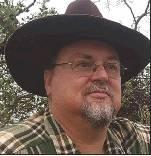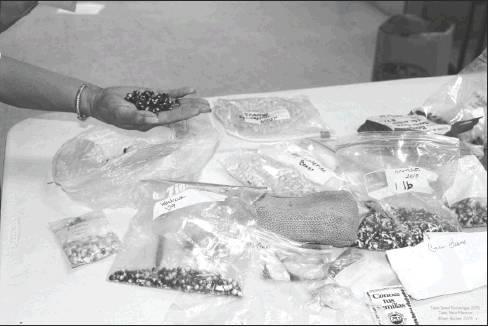Which five will you pick for 2020?
Columnist
Happy New Year, everyone! While January is the month to plan and dream about your yard and garden, smart gardeners know that a wish list drawn up in winter can feel overwhelming by spring. Instead, grow your garden a few steps at a time each year by making (and keeping) a few garden related New Year’s resolutions for 2020.
Wait just a moment, before we get to any garden related ideas, who else is wondering where the idea of making a resolution at the new year come from?
The ancient Babylonians are said to have been the first people to make New Year’s resolutions, some 4,000 years ago. They were also the first to hold recorded celebrations in honor of the new year, though for them the year began not in January but in mid-March, when the crops were planted. During a massive 12-day religious festival known as Akitu, the Babylonians crowned a new king or reaffirmed their loyalty to the reigning king. They also made promises to the gods to pay their debts and return any objects they had borrowed. These promises could be considered the forerunners of our New Year’s resolutions. If the Babylonians kept to their word, their pagan gods would bestow favor on them for the coming year. If not, they would fall out of the gods’ favor, a place no one wanted to be.
A similar practice occurred in ancient Rome, after the reform-minded emperor Julius Caesar tinkered with the calendar and established January 1 as the beginning of the new year circa 46 B.C. Named for Janus, the two-faced god whose spirit inhabited doorways and arches, January had special significance for the Romans. Believing that Janus symbolically looked backwards into the previous year and ahead into the future, the Romans offered sacrifices to the deity and made promises of good conduct for the coming year.
For early Christians, the first day of the new year became the traditional occasion for thinking about one’s past mistakes and resolving to do and be better in the future. In 1740, the English clergyman John Wesley, founder of Methodism, created the Covenant Renewal Service, most commonly held on New Year’s Eve or New Year’s Day. Also known as watch night services, they included readings from Scriptures and hymn singing, and served as a spiritual alternative to the raucous celebrations normally held to celebrate the coming of the new year. These have become increasingly popular with many evangelical Protestant churches. Watch night services held on New Year’s Eve are often spent praying and making resolutions for the coming year.
Despite the tradition’s religious roots, New Year’s resolutions today are a mostly secular practice. Instead of making promises to the gods, most people make resolutions only to themselves, and focus purely on self-improvement (which may explain why such resolutions seem so hard to follow through on). According to recent research, while as many as 45 percent of Americans say they usually make New Year’s resolutions, only 8 percent are successful in achieving their goals. But that dismal record probably won’t stop people from making resolutions anytime soon, after all, we’ve had about 4,000 years of practice. Which brings me back to what I am doing this year, and that is making a garden related resolution. May I suggest…
This winter why not resolve to: Hang a bird feeder. Build a compost bin. Invest in an excellent pruner. Order seeds for heirloom tomatoes so you can grow your own. Try a new plant combo that pleases you. Prune a crabapple or pear tree into an espalier. Ask your grandparents what they grew in their gardens. Swap seeds with fellow gardeners, Become a Texas Master Gardener. Get to know orchids, which happen to be one of the fasted growing interests in gardening circles. Build a raised bed.
In spring you might want to resolve to: Plant a fruit tree…or two. Start a compost pile. Test your soil. (Visit the county extension office in Wimberley for more information on soil tests.) Switch to organic fertilizers for your lawn and garden. Weave native plants into your flower beds. Save on grocery bills by planting your own herbs. Take a vegetable gardening class.
Order a mushroom log and grow your own fungi (I’m doing this in 2020!) Sign up for a community garden plot. Add window boxes to your home, fence, or balcony.
In summer you could resolve to: Install a rain barrel. Plant more flowers for bees and pollinators. Start a rain garden under your downspouts. Plant milkweed for monarch butterflies.
Leave your grass clippings as natural mulch on your lawn. Eat outside as often as possible.
Show a child how to plant sunflowers. Support your local growers at farmers’ markets. Learn to recognize and appreciate a “good” bug in your garden. Plant a climbing rose. Plant blueberries and Raspberries in honor of the genus Rubus, the 2020 Herb of the Year. Provide a water source for bees and butterflies. Experiment with edible landscaping: mix vegetables and flowers together in beds and borders in both the front and back yards. Transform a balcony or patio into a container garden.
In fall why not resolve to: Grow three new varieties of lettuce. Rethink all that lawn and xeriscape. Plant a berry-bearing tree or shrubs to feed the birds. Share your veggie and flower harvest with the neighbors. Preserve your vegetable harvest by learning how to can. Rake and save fallen leaves for winter mulch for your garden beds. Add a dwarf conifer to your yard.
Grow your own onions and garlic. Add allium bulbs in fall to deter deer. Save seeds from flowers and vegetables to plant next year.
A few resolutions for every season: Take time to visit the Lady Bird Johnson Wildflower in South Austin at least every three months. This way you can see what is in bloom and how it looks in each season of the year. Give plants as gifts all year long. Invite your kids into the garden. Help a child or a neighbor start a garden.
The idea, of course is to make a New Year’s resolution and then keep it. Interestingly, one study I found showed that if you make a resolution that involves a hobby or enjoyable activity (such as gardening for me) you are 60% more likely to keep it.
I wish nothing but the best for you and yours in this new year and let me be among the first to predict that as we near the year 2021, many a comic will be making jokes about looking back on 2020. Something having to do with hindsight being 2020 or some such.





